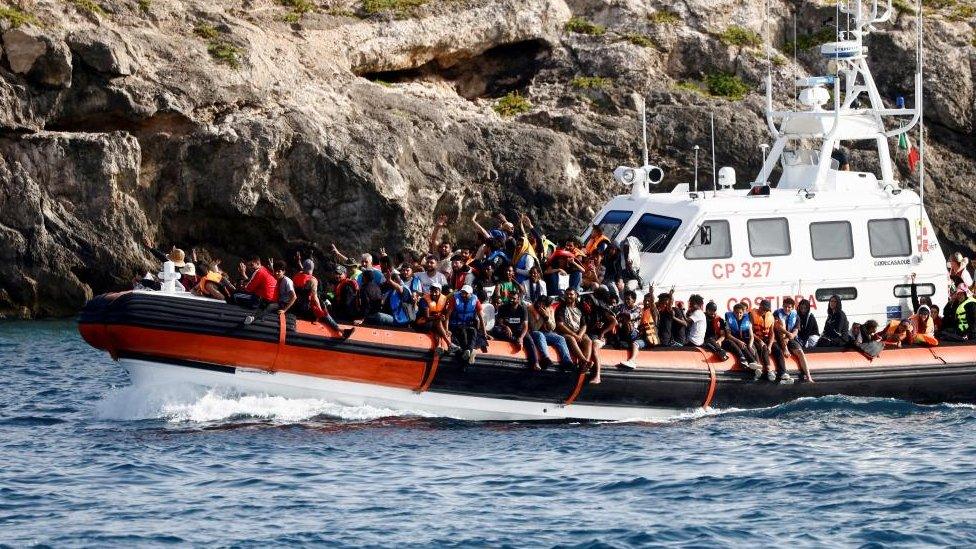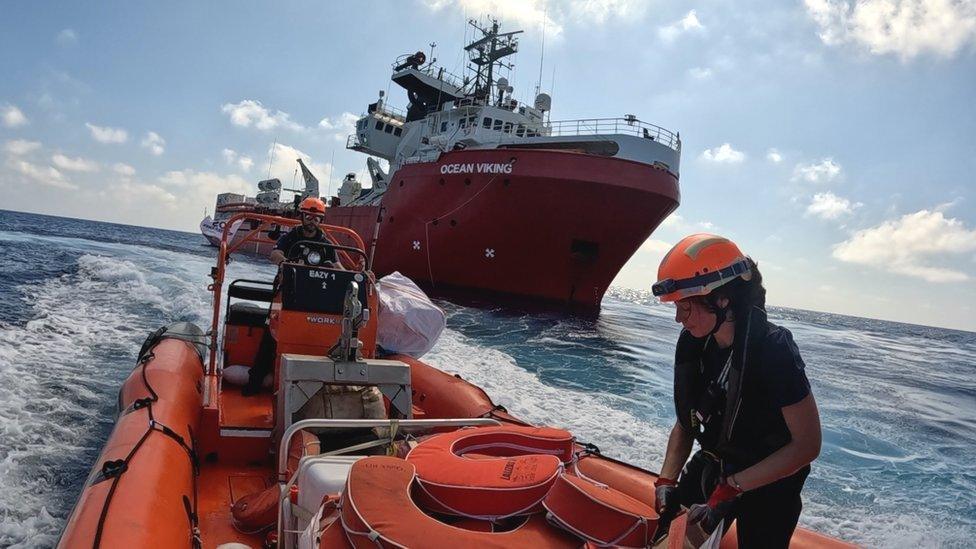EU states agree deal to tackle crises in migration and asylum
- Published

The Italian island of Lampedusa has been the gateway for many of the arrivals in Europe in recent months
EU member states have come to an agreement on overhauling their rules on responding to big increases in irregular migration.
The deal came after weeks of haggling over the EU's crisis mechanism and after a steep rise in arrivals on the Italian island of Lampedusa.
Under the plan, countries facing crisis would be able to request "solidarity contributions" from other states.
European Commission head Ursula von der Leyen praised "a real game changer".
She said the deal meant that talks could move forward with the European Parliament, with the aim of securing a migration pact in time for European Parliament elections in June 2024.
German Chancellor Olaf Scholz spoke of a "historic turning point".
Pressure for a pan-EU deal has been building for some time, because of a sharp rise in the number of refugees and migrants crossing the Mediterranean to Europe this year.
Almost 190,000 have reached the shores of southern Europe, including 133,000 in Italy, while at least 2,500 are thought to have died trying to get there, according to UN figures, external.
Italy's anti-immigration Prime Minister Giorgia Meloni has warned that front-line Mediterranean states are struggling with the high numbers. For weeks, her government has been caught up in a diplomatic spat with Germany.
While Berlin praised the humanitarian role of charities in saving lives in the Mediterranean, Ms Meloni said it was rescue ships' registered countries that should look after those they rescued. Some of the ships are registered in Germany.
News of a deal came on Wednesday from EU ambassadors in Brussels, ahead of a European Union summit in the Spanish city of Granada on Friday.
The EU said member states would be given a framework that would allow them to adjust rules during times of crisis in asylum and migration.
Countries in crisis would be able to request "solidarity contributions" from other EU countries, external, which would either relocate people seeking asylum or protection, take over responsibility for handling asylum claims, or provide financial assistance or other help.
European Commission Vice-President Margaritis Schinas called the pact the "last missing link" of the EU's migration package that would mean all member states sharing responsibility.
"It is morally, politically and legally unfair to delegate the responsibility for our external border to the five member states that geography has put them at the perimeter of our Union. This is a collective task," he explained.
Poland and Hungary have consistently refused to take asylum seekers who have entered other EU member states. Hungarian Foreign Minister Peter Szijjarto responded by accusing Brussels of acting like a magnet for irregular migrants.
Their opposition to the migration deal is not enough to undermine it because it requires a qualified majority of 15 EU member states, representing 65% of the population.

The Ocean Viking is one of a number of NGO-run ships rescuing people from the Med
Spanish Interior Minister Fernando Grande-Marlaska said the EU was now in a better position to reach a deal with the parliament by the end of its term.
However, it is not just the Mediterranean where the number of irregular migrants entering the EU is rising.
Slovakia says almost 40,000 have crossed its borders, mainly coming from Afghanistan and the Middle East, raising political tensions in Bratislava and elsewhere in Central Europe.
Poland, Austria and the Czech Republic all imposed controls on their borders with Slovakia on Wednesday. The Slovak government will follow suit on Thursday with temporary controls on its crossings with Hungary.
Central European members of the EU are all part of the border-free Schengen zone, which allows them to impose checks on a temporary basis to cope with increases in irregular migration.
Hungary also blamed the rise in irregular migration in Central Europe on Brussels. Its foreign minister said he hoped that next June's European Parliament elections would finally bring politicians to Brussels who wanted to halt migration rather than invite more in.
- Published28 September 2023
